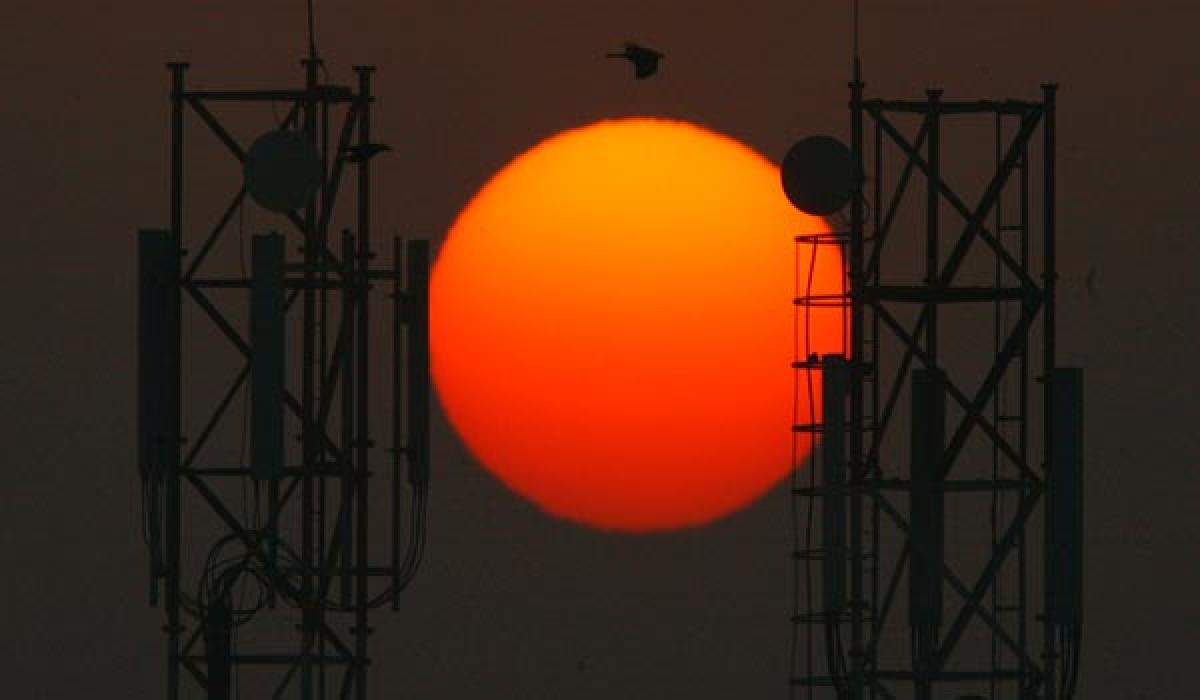Live
- G20 Leaders Will Talk About Climate, Taxes, and Trump's Return in Brazil
- COP29: CDRI announces $8 million funding for 12 projects to address climate crisis
- Anti-Telgu remarks: Actor Kasthuri Shankar moves court for bail
- Samsung AR Smart Glasses Set to Launch in 2025, Featuring Ray-Ban Meta-Like Design
- Kerala Industries Minister confident that new policy will boost plantation sector
- Madras HC plans inter-departmental monitoring committee to combat drug use in TN
- Bihar: Spotted deer dies due to heart attack in Banka district
- Mushtaq Ali T20: Shami to spearhead Bengal bowling attack, Gharami named captain
- Kharge's clarion call to oust Maharashtra's BJP-backed MahaYuti
- Why Ukraine’s Use of US Missiles Against Russia Could Lead to World War 3
Just In

New Delhi:The base price and the quantum of airwaves on offer make the next round of spectrum auctions the largest ever. But the high reserve price, notably for the 700 MHz band, and time still for the expiry of existing holdings could make the response muted, analysts warn.The views of six top brokerages and consultancies is that service providers will cherry-pick the bands they need, putting a q
New Delhi:The base price and the quantum of airwaves on offer make the next round of spectrum auctions the largest ever. But the high reserve price, notably for the 700 MHz band, and time still for the expiry of existing holdings could make the response muted, analysts warn.
The views of six top brokerages and consultancies are that service providers will cherry-pick the bands they need, putting a question mark over how much of the 2,354.55 MHz on offer across seven bands will be sought and what quantum of the $84 billion reserve price be realized.
"Since no spectrum is up for renewal for any of Bharti, Vodafone India, and Idea Cellular, we do not expect aggressive bidding," said a Goldman Sachs Global Investment Research said in its report, predicting no major surprises.
"The upcoming auction is crucial for Idea and Vodafone in our view, as they still have a large amount of 3G and 4G gaps and will look to fill those. Bharti and (Reliance) Jio have very few circles without 3G and 4G, and will try to bolster their data spectrum holding," it said.
The government has put on block 2,354.55 MHz of airwaves for sale in seven bands -- 700 MHz, 800 MHz, 900 MHz, 1,800 MHz, 2,100 MHz, 2,300 MHz and 2,500 MHz -- with a reserve price of $84 billion -- against 470.75 MHz in the previous round that saw bids worth $17 billion.
"The September 2016 auction will be the first in the past three years without material 'renewal' spectrum on offer -- not a 'gun on the head' auction for most operators, in our view," Kotak Institutional Equities said.
"To this end, this auction is a critical test of the operators' rationality; an auction where operators need to guard against getting swayed by competitive spirits and bid with long-term interests in mind; no self-goal, in other words," the brokerage added.
"In our view, 1,800 MHz and 2,100 MHz spectrum bands will see most participation from telcos," added the Goldman Sachs report, a view shared in the majority of six reports analyzed by IANS.
"We believe the 1,800 MHz would see demand from Airtel, Idea, Vodafone and Jio; 2,100 MHz from Airtel, Idea, and Vodafone; and 800 MHz from Jio and Reliance Communications. We do not expect the 700 MHz auction to be a success," said Morgan Stanley.
"The reserve price of the 700 MHz band is at 4x (four times higher than) the reserve price of 1,800 MHz. Thus, if an operator intends to bid for one block (5 MHz) of spectrum pan-India, it would need to spend Rs 574 billion or $8.5 billion."
In the Delhi circle, the reserve price for 700 MHz is pegged at Rs 1,595 crore per MHz -- which is the highest -- and for pan-India, it is Rs 11,485 per MHz.
"We expect Vodafone and Idea to add more spectrum in the 1,800 MHz band to enhance their 4G spectrum holdings," Edelweiss said, otherwise expecting the response to be lukewarm in the 700 MHz band on account of high reserve price for 700 MHz band.
The brokerage also expected some shakeout in the industry once Jio announces a full commercial launch. "We remain cautious on the sector due to sustained high CapEx and the anticipation of increased competitive intensity with the launch of Reliance Jio."
Bank of America Merrill Lynch also cautioned about the 700 MHz pickup, citing reasons like high pricing, relatively immature handset and equipment eco-system and the already available 4G spectrum in other bands like 1,800 Mhz and 2,300 MHz.
The government said operators will have the choice of both upfront payments and installment options. The service providers who win airwaves below 1 GHz bandwidth will have to pay 25 per cent upfront, and those winning above that the upfront payment will be 50 per cent.
"There are no surprises in the Notice Inviting Application apart from the 50 per cent upfront payment condition for spectrum above 1GHz. This will further burden the balance sheets of companies which are looking to acquire spectrum, especially in the 1,800 MHz band," Edelweiss said.
Deutsche Bank Market Research cautioned that increased realism on the competitive landscape will reduce the number of bidders. "We estimate total proceeds at around Rs 70 to Rs 120 billion. Furthermore, the change in revenue-share framework for spectrum payments benefits Bharti and Jio."
Bank of America Merrill Lynch also commented on the proposed move by the watchdog to scrap charges paid to carriers on whose networks calls are received. "Such a move in our view, will impact Bharti and Idea as they are net interconnect gainers and positively benefit smaller telcos and new entrant Jio."

© 2024 Hyderabad Media House Limited/The Hans India. All rights reserved. Powered by hocalwire.com







